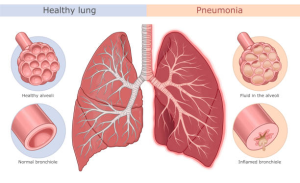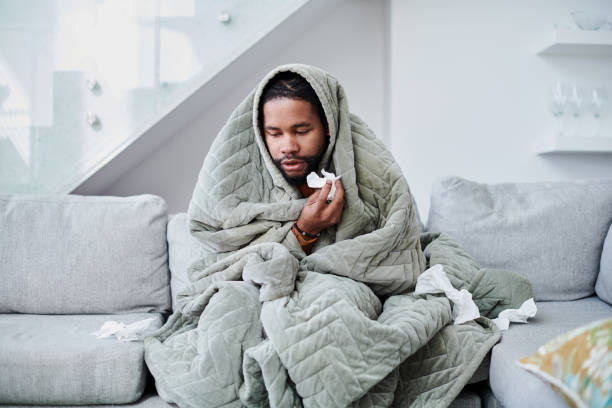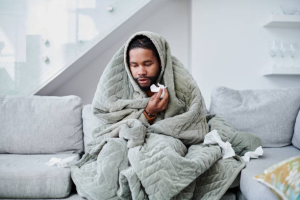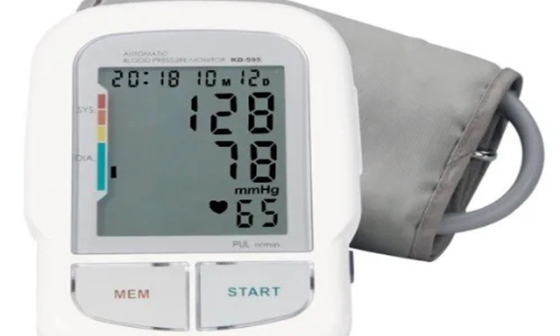As we enter the cooler months and the end of the year (harmattan/dry season), many parents may worry that exposure to cold weather might directly cause pneumonia. The short answer is NO! This is a widespread misconception, particularly when flu or cold symptoms develop. While cold weather does not cause pneumonia, some conditions linked to the colder seasons can raise your chances of having it.
Credit: iStock/ Jeff Bergen
What is Pneumonia?
Pneumonia is an illness that causes inflammation of the air sacs in one or both lungs. WHO reports that pneumonia is the single largest infectious cause of death in children worldwide. Research in 2022 reports a high prevalence of pneumonia and malnutrition and other researchers report that Nigeria has the largest absolute number of annual paediatric pneumonia deaths globally with pneumonia accounting for 20% of under-5 deaths.

Credit: iStock/ Refluo
In pneumonia, the air sacs can fill with fluid or pus (purulent material), resulting in a phlegmy cough, fever, chills, and difficulty breathing. Various microorganisms, such as bacteria, viruses, and fungi cause pneumonia.
- Bacteria: Bacterial pneumonia is frequently caused by Streptococcus spp; Streptococcus pneumoniae is the most frequent. Bacterial pneumonia is most commonly found in adults.
- Viruses: The most common causative organisms in children are influenza (the flu) virus, respiratory syncytial virus (RSV), and more recently, COVID-19.
- Fungi: More common in individuals with weakened immune systems, such as coccidioidomycosis, histoplasmosis, and blastomycosis
Pneumonia can be minor or life-threatening. It is especially dangerous for infants and young children, adults over the age of 65, and those with medical conditions or compromised immune systems.
Pneumonia Symptoms
Pneumonia symptoms may include the following:
- Chest pain during breathing or coughing
- Shortness of breath
- Fatigue
- Fever, sweat, and shivering chills
- Cough, which can generate phlegm.
- Nausea, vomiting, or diarrhoea.
- Confusion or alterations in mental awareness (in persons aged >64 )
- Lower than normal body temperature (in those over 65 and those with weakened immune systems)
- Newborns and infants may not exhibit any symptoms of the infection. They may also vomit, have a fever and cough, appear restless or exhausted and depleted of energy, or struggle to breathe and eat.
Cold Weather and Pneumonia
Though cold weather does not cause pneumonia, it might add to variables that increase your chance of contracting the condition.
- Viral Infections: Cold weather can raise the risk of viral diseases like the flu and colds. These viral infections can damage the lungs and immune system, allowing bacterial pneumonia to take hold when the immune cells are not active to wade off infections.
- Weakened Immune Response: Cold temperatures are known to weaken the body’s defence mechanisms, causing individuals to stay home with loved ones. Staying indoors isn’t inherently bad, but congested environments quicken the spread of infectious agents that cause pneumonia.
- Respiratory Irritation: Breathing in cold, dry air can irritate the respiratory system. Inflammation caused by this irritation can render the lungs more vulnerable to infections.
Pneumonia Risk Factors
Pneumonia can harm anyone. However, the two age groups with the highest risk are Children aged 2 years or younger and People aged 65 or older. Other risk factors include:
- Smoking: Smoking destroys cells that line the respiratory system and depletes your body’s natural defences against the germs and viruses that cause pneumonia.
- Chronic respiratory disease: Asthma, chronic obstructive pulmonary disease (COPD), and heart disease all increase your risk of contracting pneumonia.
- Medical conditions that weaken the immune system: The immune system has been weakened or repressed in people with HIV/AIDS, organ transplant recipients, and those receiving chemotherapy or long-term steroids are all at risk.
- Hospitalization: If you’re in a hospital intensive care unit (ICU), you’re more likely to get pneumonia, especially if you’re on a ventilator.
Prevention Tips
Here’s how you may lower your risk of pneumonia, especially during the colder months:
- Wash your hands frequently: Good hand hygiene helps to prevent the transmission of germs.
- Boost your immune system: Eat a good diet, stay hydrated, get enough sleep, and manage stress.
- Avoid smoking: It harms the lungs and makes them more prone to infections.
- Stay warm: When it’s cold outside, dress appropriately and avoid spending too long outside.
- Get vaccinated: Vaccines for influenza and pneumococcal pneumonia can help prevent infections that cause pneumonia.
Conclusion
Cold weather does not cause pneumonia; nevertheless, it might raise the chance of developing it due to viral infections, decreased immunity, and respiratory irritation. If you have persistent symptoms, especially after a cold, see a doctor to be checked for pneumonia and treated appropriately.
Wellahealth provides accessible and affordable health coverage for as low as #800/month, this health plan covers; doctor’s consultations, drugs, and laboratory tests. To learn more about these health plans, contact Wellahealth today!
Article written by Dr. Ifeoma M. Uduh (BDS)
Edited by Dr. John Afam-Osemene (MBBS, DA)







